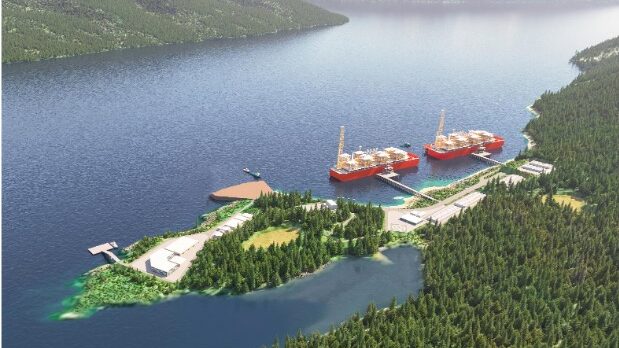The Indigenous-led Ksi Lisims LNG project has been granted its environmental assessment certificate allowing the project to advance.
The project site is located 78 kilometres north of Prince Rupert, on the Portland Canal, with commercial operations expected to begin in late 2028 or 2029.
The Ksi Lisims LNG will be serviced with natural gas from the Prince Rupert Gas Transmission Pipeline and is expected to add billions of dollars to both the federal and provincial gross domestic product (GDP). It is estimated that the project will employ around 800 workers during peak construction and up to 250 permanent positions.
B.C. Premier David Eby said the timing is right for this project.
“There’s never been a more critical time to diversify our economy and reduce reliance on the U.S., and B.C. is leading the way in Canada, with clean electricity, skilled workers and strong partnerships with First Nations.”
The project is being spearheaded by the Nisga’a Nation with the help of Rockies LNG and Western LNG. They hope to begin construction later this year.
The facility is designed to have the lowest unit carbon emissions rates of any large-scale LNG export project in the world and is required to have net-zero emission capabilities by 2030.
B.C. Minister of Environment and Parks Tamara Davidson said the government is taking steps to protect the environment.
“In addition to being net-zero by 2030, the Ksi Lisims project is required to meet 23 legally binding provincial conditions to safeguard our environment. The people of British Columbia expect their government to thoroughly assess proposed developments to make sure projects are sustainable. That’s how we create good jobs and drive needed economic growth, while protecting our environment and keeping communities healthy and safe.”
Before approving the project, government officials consulted with First Nations peoples of Gitga’at, Gitxaala, Kitselas, Kitsumkalum, Lax Kw’alaams and Metlakatla. Gitga’at and Kitselas offered their consent while Lax Kw’alaams and Metlakatla participated in a dispute resolution. Kitsumkalum did not consent and Gitxaala did not provide anything regarding consent.
While not all the concerns have been resolved, officials said requirements of the environmental assessment certificate address many of the First Nations’ concerns.






